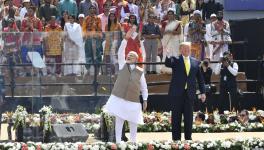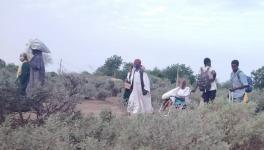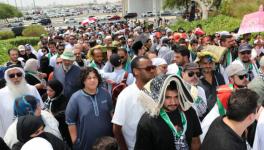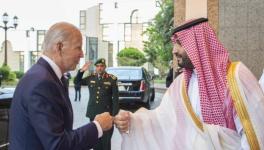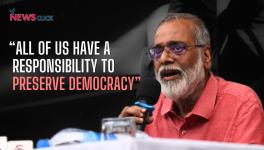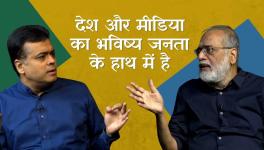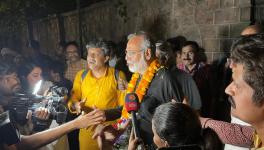Patrons of ISIS Rethinking Their Strategy?
Egypt has retaliated to the beheading of Egyptian Christians by ISIS through bombing and targeting their network in Libya. Newsclick interviewed Prof. Aijaz Ahmed, well know political commentator to discuss the latest events in West Asia and North Africa, particularly with Jordan and Egypt attacking ISIS. Jordan was used as a base for the Jihadi attacks on Syria Prof. Aijaz taks about the increasing difficulty that Egypt faces at home with Muslim Brotherhood and also the attacks that the Sisi government has launched on the democratic forces that fought in Tahrir Square against Mubarak. Prof. Aijaz thinks that Saudi Arabia and the US needs to rethink their strategies regarding Islamist groups whom they have supported against Iran. They cannot fight Iran using such groups and yet think they will not be singed by the fires they are fanning.
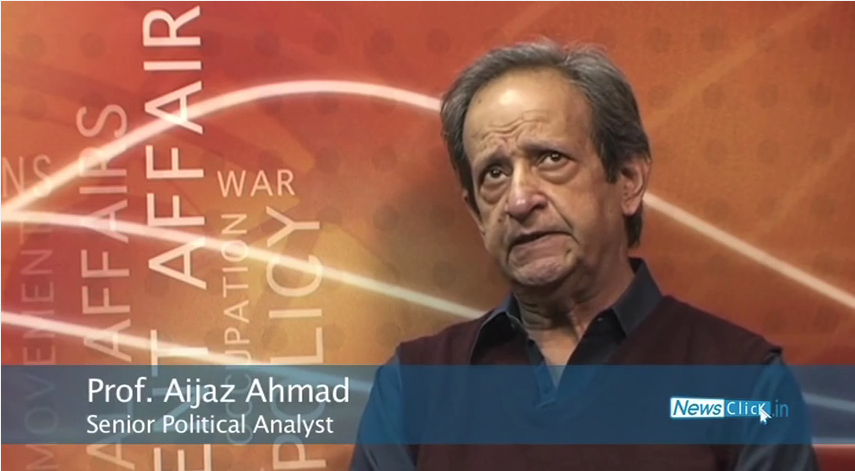
Rough Transcript
Prabir Purkayastha (PP): Hello and welcome to Newsclick. Today, we have with us Prof. Aijaz Ahmad, a well known political commentator to discuss latest events which have rocking West Asia, and North Africa and the west calls Middle East. Aijaz, we already had this issue about Libya now been drawn into air strikes by the Egyptian armed forces essentially been in response to Egyptian Christians being killed there. Earlier, we had similar kind of thing with Jordan. Jordanian Airforce bombing ISIS or IS whatever now it's been called. Do you think the war that was started essentially in Syria then spread to Iraq back and forth now is getting much larger?
Aijaz Ahmad (AA): Well, I think that's one way of looking at this new sort of alignment with Islamic terrorist and so forth. The Libyan group is the group that has become the part of the IS but I think that is something else that is specifically Egyptian which is connected with this. One, Egypt has been on the one hand going after Islamists in the Sinai alleging them to be connected with Al Qaeda or more often with Hamas and so on. More recently, after the Davos meeting, when he returned Sisi with accolades from all over the West, came back and called upon Egyptians to help him. So this escalation against the Islamic terrorist on the part of Egypt is I think is also tied up with increasing difficulty at home with Muslim Brotherhood and so on and he wants to somehow tie up the Hamas, Sinai and that's particularly Egyptian, the decision that IS that he has taken. The other part in this is again specifically Egyptian Sisi has not waged against Bashar Al Assad. He has improved his ties with the Russian. More recently they are trying to put up a group of opposition leaders distinct from the existing defunct one that the West has been pushing overlapping with it for mediation in Syria. That links up with the new scenario which developing of creating of, Jordan you mentioned, changing its colours. It has been supporting all of those Jehadis and now bombing them etc. In that I think we will also have to watch Saudi Arabia. The Saudis are not feeling the heat of the IS which has called for strikes inside Saudi Arabia and there has been a shift in dispensation in Riyadh.
PP: Before we come to Saudi Arabia, quick question on Egypt. But Egypt's internal policy of cracking down all shades from left to Muslim Brotherhood still continues and really no judicial supervision whatsoever almost entirely military dictating to what kind of punishment should be levied and with lot of democratic groups which have fought the earlier military dictatorship of Mubarak are all in Jail now.
AA: Yes. I mean its different kinds of figures which keeps flying around now and there is said to be around 40,000 political prisoners and not all of them are Muslims. A lot of the liberal young revolutionaries in Tehrik Square that's what you want to call them are imprisoned or in exile. A lot of them have fled.
PP: There is also this recent tape which is now doing the rounds that he has actually extorted money from the Gulf States in order to bolster really the military regime.
AA: Absolutely, I mean several kinds of tapes are there. One is this, really extorting money to do that on their behalf. Secondly, there are tapes of involving all the military high brass which undermine the entire case against Morsi and their plotting is there on those tapes. There were some questions of authentication of it but a number of very independent people, who are reliable people say they recognize the voices. So those tapes are in a sense explosive but will they have any effect, I doubt it and the Gulf countries are now at so much at each other’s throats and the whole thing is shifting around so much, it's very unclear. On the one day we find the leaders of the Egyptian Muslim brotherhood who were located for Qatar for quite a while, have been asked to leave Qatar. They are so angry with Sisi that they made hs plane turn around mid way but they invite Hanushi, Muslim brotherhood of Tunisia. In Saudi Arabia reconsidering establishing relationships with Muslim brotherhood as an ally against this IS and other Islamists which they have created over a long period of time who have now become a danger to them.
PP: Saudi Arabia is of course always an interesting question because it's 22,000 princes of different tribes with now almost all the second generation being over. Now, I think 2 or 3 princes are left from earlier Al Saud.
AA: Yeah, most of them have unable to function included the new one.
PP: The new one who is supposed to be suffering from Dementia and so on. But, you do see a change of guard in some sense because there is Deputy Crown Prince who is from the third generation, the first third generation leader and this seems to be an indication that he is going to be really strong man of the regime.
AA: He is going to be strong man in the regime probably a likely successor and unless some other surprises coming, one great thing is Bandar Abbas, the prince Bandar Bush some people call him is out and gone.
PP: Do you think that now Saudi Arabia is going to shift its position regarding Isalmic Terrorist as you just said now ISIS whatever we call them. Are we still going to see them as a strategic ally in the larger tussle with Iran which they see with themselves as competition?
AA: Well, I think one major decision that they take they have to make is actually with respect to Yemen and the fiction that they have created that the Zaidis among whom the Hotis are the most prominent tribesmen family, the Zaidi Shia are somehow are the front for the Iranians. They have to revisit that fiction. But if they hold on to that fiction and if they get mired now, in the anti Iran, anti Shia fantasy that they have then they cannot break with IS and so and they will get deeper into crisis. What they will do is very hard to predict because this is the group that has been out of power.
PP: Interestingly the United States, originally the instigator of rebellions against Syria, now reports are there that special forces are there in Syria both from Britain and from United States in Syria well before any public notice was taken of this and it's clear Jordan was really the centre which all this was driven. Jordan is getting knocked in this particular fashion. Do you think the US in now having to reevaluate its position on IS and on Syria and the Iraq, Iran on this issue? Do you think it's still playing kind of playing both sides like Saudi Arabia.
AA: I think they are still playing both sides. I think there is a very considerable disagreement within the administration over which way to go here as well in Ukraine but they would find it very very difficult to really go after IS themselves unless they have boots in the ground. So one thing is that even if there was in intention, there was no capacity except for some really crazy people, most of the US administration and public opinion etc were opposed to it. So they themselves cannot do it. All the allies in the regions, main allies in the regions mainly Saudi Arabia and Turkey are deeply implicated with those Jihadis. As you said, Jordan was the centre of it from the beginning until three weeks ago we really don't know what's going on now. All of that paraphernalia are in Jordan. Jordan is now a big enough power to take care of IS all by itself. They can bomb; Americans can throw in drones and so on. But they cannot gain territory. That is assuming that Americans want to do it. But the fact of the matter is that Americans need these Jihadis all over the place and they have been trying to have the cake and eat it too and it's not working.
PP: Their basic thing is you know it singes everybody we are still protected by oceans and so and the only question is European Muslims who come back and may start something in their countries. But even that does not affect the United States. So they have a distance if they keep all this going. They still have a distance from this theatre.
AA: Sure, but they have their oil interest but those unfortunately are not movable. They remain where they are. They have their interest with Israel and which way these Jihadis will eventually go, which faction of them will turn against Israel one of these days.
PP: State of flux at the moment whether is Libya, whether it is Jordan, whether it is Iraq, where Iranian forces are involved or at least advisors are involved in the ground and the only two powers who can provide booths on the ground are Syria and Iran. There are the two of the crosses of Saudi Arabia and crosses of Turkey as well as the United States and of course France, UK and so on. So still to see what happens but things have started to change as the fires they have lit have started to singe their allies. Would you say about that?
AA: Yes, that is absolutely true and I would say that the only country that seems to have had from the beginning is absolutely clear strategic line is Iran. It has known from the beginning that if it really comes to a fight, they will go in an extremely measured way. Americans and Daish are not going to dictate how they go where they go, at what speed, that to start with ammunition, the guidance will be there, the personnel will be that of Hezbullah. Hezbullah went in a very big way from the beginning, I mean, in a very open way from the beginning, it is still there and they have very precise objectives to gradually clear up as much of the Syrian territory as possible that the Damascus is protected, the main regions are protected and slowly they get flushed out of the Syrian territory, that is it. There is not Iraq, and that is going to take its own time. They are not going to be pushed by American you know by the American calender. So they are the only ones in my view who have had very clear strategic objectives they are implementing.
PP: Lets watch what happens and I am sure things are starting to change and we will see basically most of the regions re-evaluating those who have been in the side of different forms will start to reevaluate what they are likely to do otherwise they themselves are going to be increasingly the effected. Thank you very much Aijaz for being with us and we shall continue the discussion as and when the things change in the West Asia.
Get the latest reports & analysis with people's perspective on Protests, movements & deep analytical videos, discussions of the current affairs in your Telegram app. Subscribe to NewsClick's Telegram channel & get Real-Time updates on stories, as they get published on our website.










